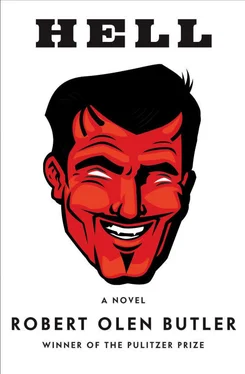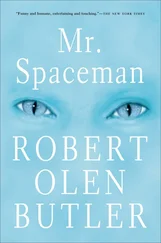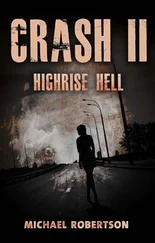He heads down a corridor of offices, the doors all standing open, the windows inside showing the tops of other buildings, the offices flashing by looking identical. Mid-corridor he stops at one. He stands in the doorway. It has a desk and a high-backed leather chair and a computer, with its screen dark. It has in-and-out trays with nothing going in or out and an empty pen holder on the desktop and a potted ficus standing in a corner. But there is not one personal item. And it’s the same in all the other offices, he’s certain. There is no sign of any other soul. He wants to look out at the Great Metropolis of Heaven, and he thinks to step to this window now, but he doesn’t. The absence of any apparent human touch pushes him away.
He turns and strides back along the corridor and past the reception desk and out the door and along to the elevator. He pushes the UP button and the elevator he arrived in opens up instantly. He steps in. He pushes 55.
And floor 55 turns out to be entirely unpartitioned and unfurnished, one vast carpeted space with wide, tall windows, and Heaven to its horizon is out there waiting for him. He crosses the floor, heading for the center of the far wall where he can see the bright concentration of morning light. East, he presumes.
Hatcher arrives at the window and draws close, his breath showing up faintly there, and he looks out: the sun is still low, where it’s rising, and he can see a horizon, at least a place where sight ends, and it seems lushly green at that far point. Hatcher stares directly at the sun — a liquid golden orb that appears more luminous than thermonuclear — and its light touches his eyes like a soft breeze. Hatcher looks sharply downward, and nearby is a clustering of lower high-rises, their roofs pristine and their glass facades crystalline, and farther out is a broad park, dense with trees — a park different from the one with his recliner, this being the opposite side of the city — and beyond the park is another neighborhood of freestanding mansions, from this height mostly dormers and pitched roofs and parapets and stacked chimney caps and turrets. And lifting his eyes beyond the mansions, Hatcher finds an abrupt end of the city. A rolling green landscape that he does not take in at once.
Instead, he looks back down on his new Great Metropolis. Something clearly noticeable is there but it waits, still, to claim his attention. Slicing through all that he is seeing of the city is a web of broad, immaculate thoroughfares, laid out straight and true, and he has been taking them in, these streets, as he notices the neighborhoods, but now he sags forward against the window with a realization. He presses his face there and lays his palms against the glass as he understands that the streets are utterly empty. He has seen this in one way or another over and over since he’s arrived, but only now has it finally accumulated into a deep and overwhelming and unmitigated conviction. This building is empty. All the buildings are empty. All the shops. All the houses. All the streets. Heaven is you, alone. I am alone .
Can this be? he asks inside his head. It is not a rhetorical question for himself. He is speaking to God, a thing he has not done in a long time. There is no answer. Not even in Heaven. It was not long ago that he skidded to this conclusion. No one is listening. No one. Alone, indeed. But there’s coffee and cheeseburgers and good weather and a good chair. Heaven. Somebody would assume he’s a happy man now. Somebody. He tries to remember who said something like that. Said he’s happier alone. Something. Someone. He doesn’t know who. He even feels himself losing hold of the notion that anyone at all said anything like that. He tracks the empty boulevards with his eyes now. He looks up and down and up and down. He searches every one of them. Someone else should be here. But he can’t remember any faces to imagine down there. He’s even losing an image of crowded streets of any kind. He gasps. He knocks his head against the glass. Hard. And again, harder. It doesn’t hurt at all.
And now he lifts his eyes beyond the city. That rolling countryside. There’s something about it. But it’s distant and he can’t see. And as soon as he thinks this, he realizes that there is an object standing next to him. He turns. A telescope. He steps behind and puts his eye to the viewer, and the instrument is already focused exactly where he wishes to look. And he sees a rolling countryside with trees and a farmhouse and barns and a cornfield, and far ahead, a little village with a church steeple and a school and a neighborhood of white houses and the sun high in the sky and, most importantly, there is a truck, a bright blue panel truck with big round fenders and it is on the road through the countryside and it is heading for the little village and on the side of the truck is the word BREAD. It is exactly the scene from his book, from his favorite book when he was little Hatchy, little little Hatchy, somebody’s perfect little nookykins. Somebody.
Hatcher rears back from the telescope and deep in his throat he makes a guttural grinding whatthefuckisgoingon sound, probably not heard before in Heaven. But no one is listening anyway. He puts his eye to the viewer once more. The truck. When he was a little boy reading this book over and over in the window seat in his room with the sun falling on the pages and when he was taking delight in that truck, he thought someone was driving it. Who? He can’t recall. It was part of the delight, once upon a time. For someone in particular to be driving. He looks at the truck. The truck is moving but it doesn’t seem to be any farther along on the road. It is moving when he looks at it, but when he compares it to the landscape, it is opposite the near edge of the cornfield. Which is where it was a moment ago. Okay. Okay.
Hatcher backs away from the window. He turns and he jogs across the wide floor and out into the hallway and he punches the elevator call button and the doors open and he gets in and he heads for the lobby, thinking somehow this place will grant his present wish.

And it does. In the form of a 2006 fire-engine red Maserati Spyder, Hatcher’s last car, sitting at the curb outside the skyscraper. Hatcher gets in, puts the top down, and starts the engine, revving the Hell out of it and thrilling to the red-line roar going up his accelerator leg and into his crotch. And he rips into gear and takes off, peeling down the street along the setback and fishtailing a right turn and screaming past the high-rises and through the park, and then the Italian Renaissance mansions and the Chateauesque mansions and the Beaux Arts mansions all vanish in a blur as he Maseratis through the empty streets of this city without stoplights, and he is into the countryside and he’s leaping the sweet little green hills and racing past the farmhouse and the barns, and the cornfield is up ahead and so is the blue truck, and Hatcher downshifts and he comes up fast on the back of the truck and he shifts down again and he brakes, and they are doing twenty, he in his Maserati and the bread truck.
The road is narrow. Too narrow to pass. And so they drive like this for a while and the cornfield does at last go by but then another cornfield begins and when that one is gone, there is another, and he can go on like this for as long as he wants, he realizes, following the blue bread truck through the perfect countryside. Hatcher can smell the bread for a moment. He has a warm lolling in his limbs. Now the air smells of fresh cut grass. He feels as if he’s sitting in his recliner on the top of the rise. Even the Maserati has stopped complaining about second gear.
Hatcher wonders: why am I doing this? Why did I race out here to catch the blue truck? It’s okay. It’s pleasant, following the truck. It’s very pleasant. And what’s that new smell? Teaberry gum. It smells like Teaberry gum out here. Whatever happened to Teaberry gum? And he knows if he opens the glove box, he will find packs of Teaberry gum. His head is so sweetly mellow he can hardly think. But some little unadjusted something in him cries out, in a wee tremulous voice: what the fuck?
Читать дальше













